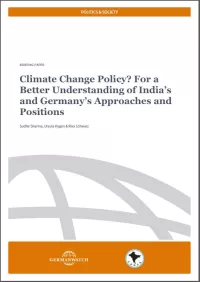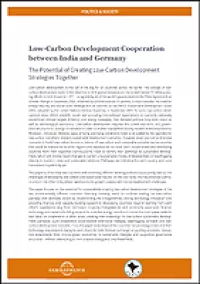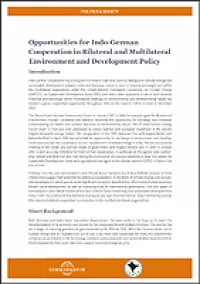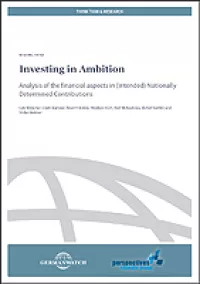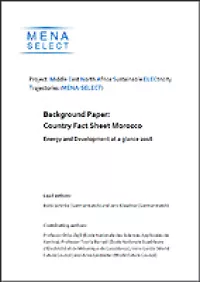
Aktuelles zum Thema
Publication
It is, without doubt, difficult to compare India and Germany as the cultural and socio-economic differences are striking. With this paper, Germanwatch and CANSA seek to introduce some of the backgrounds to the different climate policy approaches of India and Germany with a view to the ambitious and equitable implementation of the Paris Agreement.
Publication
The Potential of Creating Low-Carbon Development Strategies Together
Indo-German cooperation on low-carbon development can reach far beyond should dialogue on and provision of German support for an Indian low-carbon energy mix. Germany, in turn, should seek inspiration from India as well. An Indo-German dialogue on low-carbon development should therefore allow exchange in partnership on more fundamental aspects of a low-carbon development such as sustainable guiding principles, lifestyles, sustainable business concepts and economic and governance structures.
Blogpost
Blog post by Vera Künzel and Alexander Reif, July 2016
The Nansen Initiative, which ended in 2015, developed a comprehensive "Protection Agenda” over the course of 3 years, which to date has been endorsed by over 100 countries. Although not producing new legal regulations, the initiative was pioneering in that it was the first intergovernmental process to work on protecting people displaced across borders by disasters and in the context of climate change. Its focus on exploring existing political instruments in order to close the protection gap has made for a solid foundation for further work. Now next steps are to be taken.
Publication
Bilateral Indo-German cooperation has proven to build mutual understanding and trust in finding solutions in international negotiations. Bilateral cooperation experience has provided learning and confidence for various negotiation items at UNFCCC. A fruitful implementation of the Indo-German Solar Partnership would build further evidence for healthy bilateral cooperation and would support implementing the Paris Agreement jointly.
Publication
28th to 30th June 2016, Korea
This is the Climate Finance Advisory Service (CFAS) Daily Briefing. Produced at key meetings and negotiations by the CFAS expert team, the Daily Briefings try to provide a concise, informative update on key discussions that have taken place at each day of the meeting and give an overview of substantive points of action or progress.
Press Release
The Peruvian mountain guide Saúl Luciano Lliuya is demanding that the Essen Regional Court in Germany order the energy firm to pay for safety measures to protect his home town. Climate change has caused a glacial lake to fill up to the brim, threatening to flood the city of Huaraz.
Representing RWE, the law firm Freshfields Bruckhaus Deringer has filed its first response to a civil suit filed by the Peruvian small-scale farmer and mountain guide Saúl Luciano Lliuya. The german firm denies responsibility for climate change impacts in the Peruvian Andes. In the written statement, the lawyers claim that RWE has no liability under German civil law. The claimant Saúl Luciano Lliuya expected such a reaction and is determined to pursue his case at the Essen Regional Court (Germany) in a hearing this autumn with his Hamburg lawyer Dr. Roda Verheyen: “RWE needs to take responsibility for its emissions. We in Peru have hardly made any contribution to climate change, but we live with the worst consequences.”
Blogpost
Blog post by Lisa Junghans, May 2016
In this blog Lisa Junghans, Policy Advisor for Climate Change, Adaptation & Urban Transformation, discusses the opportunities for cities under the GCF, and how achieving a paradigm shift needs bundled power from all sides.
Publication
Analysis of the financial aspects in (Intended) Nationally Determined Contributions
Nationally Determined Contributions (NDCs) are a centrepiece of the new global climate regime which was agreed at COP21 in Paris and form the foundation for the pathway towards a low-carbon and climate resilient development. This paper analyses specifically the financial aspects included in the INDCs and aims to contribute towards a definition of comprehensive financing strategies for implementing NDCs. It provides an analytical overview of the financial aspects that have been included in the INDCs submitted so far and provides a discussion of options for financing NDC implementation.
Publication
Project: Middle East North Africa Sustainable ELECtricity Trajectories (MENA-SELECT)
Reliable energy supply is vitally important to meet the growing electricity demand and hence to sustain the socio-economic progress of Morocco. With the kingdom's electricity consumption projected to double by 2025 and to increase more than five times by 2050, substantial investments in additional power generation capacities are required. Faced by the dual challenge of importing 96% of its energy supplies as fossil fuels from abroad, and being highly vulnerable to the effects of climate change, Morocco has, therefore, explicitly set low-carbon and climate change resilient development as its strategic development priority.
Blogpost
Blog post by Lisa Junghans and Sönke Kreft, April 2016
Within two generations our entire energy system needs to be carbon free for the world to avoid dangerous impacts of climate change. This transformation needs to happen first in developed countries then in all countries soon afterwards. With the majority of the world’s population residing in urban areas releasing more than 70% of global greenhouse gas emissions, the necessity for cities to take centre stage in addressing climate change is without doubt. Cities are often hotspots of climate vulnerability, hosting masses of marginalised and poor people that have little to resist floods, cyclones, and storms. Experts often talk about the need for an urban transformation towards low carbon and climate resilient development. In practical terms, such a transformation requires a significant makeover and adjustment of urban structures, its organisation, and its residents’ lifestyles.

